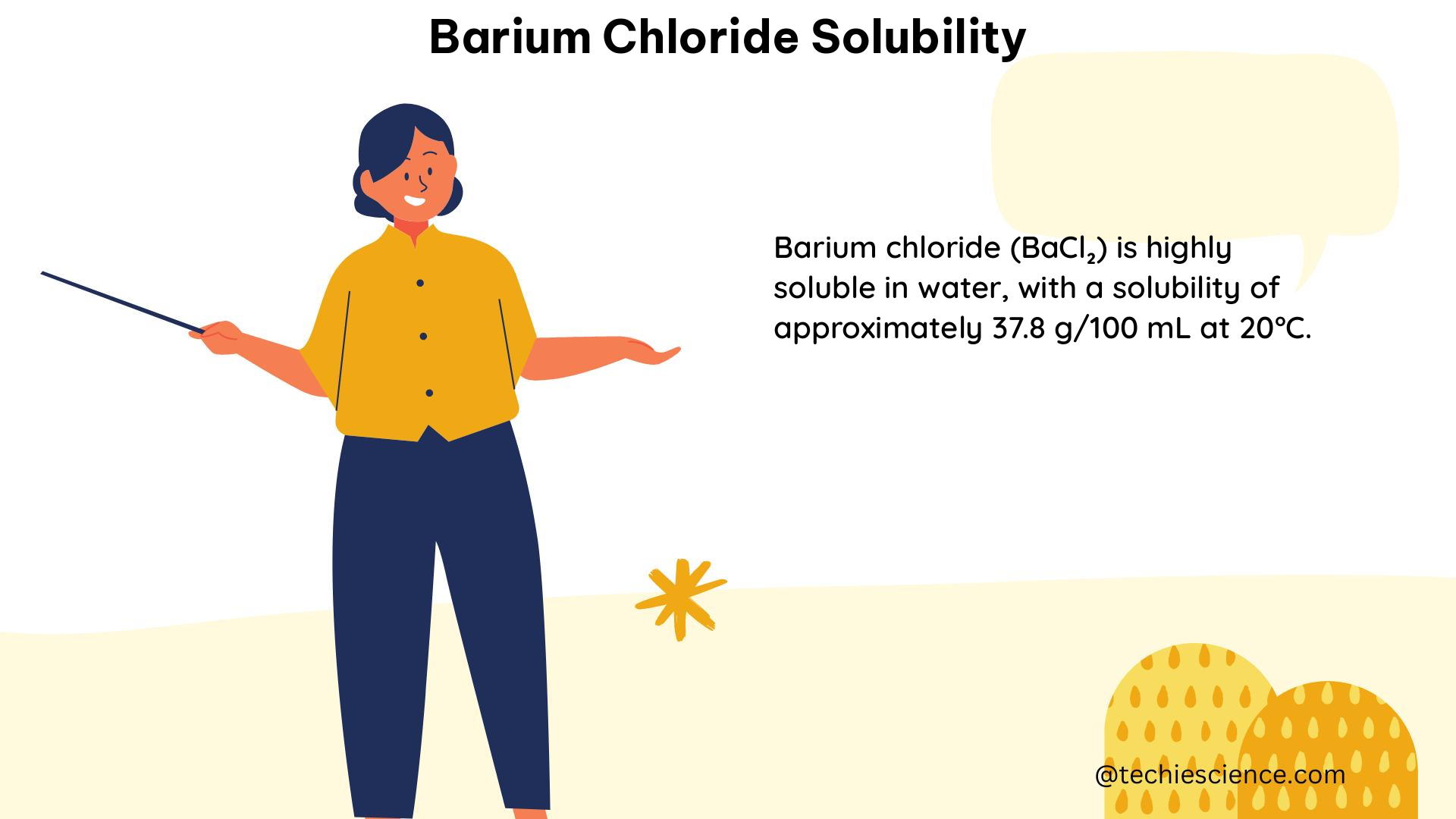Summary
Barium chloride (BaCl₂) is a widely used chemical compound with a range of industrial and scientific applications. Its solubility in water is a crucial factor in determining its behavior and effectiveness in various processes. This comprehensive guide delves into the intricate details of barium chloride solubility, providing a wealth of technical information and practical insights for science students and professionals.
Understanding Barium Chloride Solubility

Solubility in Water
Barium chloride has a solubility of 375 g/L (26°C) in water, which is considered relatively high. However, its solubility at room temperature is much lower, with only 0.001125 g/100 mL (0.01125 g/L) dissolving in water. This discrepancy highlights the significant impact of temperature on the solubility of barium chloride.
The solubility of barium chloride in water is also influenced by the concentration of total sulfate in the medium. The presence of sulfate ions can reduce the solubility of barium chloride, making it difficult to maintain concentrations higher than 1.5 mg/L in water.
To calculate the solubility of barium chloride in water, the following formula can be used:
Solubility (g/L) = Mass of Barium Chloride Dissolved / Volume of Water
For example, if 10 g of barium chloride is dissolved in 100 mL of water, the solubility would be:
Solubility = 10 g / 0.1 L = 100 g/L
Solubility in Ethanol
Barium chloride is insoluble in ethanol, meaning that it does not dissolve in this organic solvent. This property can be useful in certain separation and purification processes, where barium chloride can be selectively precipitated from an ethanol-based solution.
Solubility of Barium Chloride Dihydrate
The solubility of barium chloride dihydrate (BaCl₂·2H₂O) is an important consideration, as this is the most common form of barium chloride used in various applications. The solubility of barium chloride dihydrate is 56.2% Ba, which means that for every 100 g of the compound, 56.2 g is the actual barium content.
Technical Specifications of Barium Chloride
Barium chloride is available in various physical forms, including crystals, granules, and powder. It has a bitter, salty taste and a high melting point of 962°C.
The molecular formula of barium chloride is BaCl₂, and its molecular weight is 208.25 g/mol. It has a CAS number of 10361-37-2 and is typically produced from naturally occurring barium ores, such as barite (BaSO₄) and witherite (BaCO₃).
Experimental Determination of Barium Chloride Solubility
To measure the solubility of barium chloride experimentally, one can follow these steps:
- Weigh a known quantity of barium chloride (e.g., 10 g).
- Add the barium chloride to a measured volume of water (e.g., 100 mL) in a beaker or flask.
- Stir the mixture continuously until the barium chloride is fully dissolved.
- Measure the final volume of the solution.
- Calculate the solubility using the formula:
Solubility (g/L) = Mass of Barium Chloride Dissolved / Final Volume of Solution
It is important to note that barium chloride is moderately to highly toxic if ingested, so appropriate safety precautions should be taken when handling the compound, such as wearing personal protective equipment (PPE) and working in a well-ventilated area.
Factors Affecting Barium Chloride Solubility
Several factors can influence the solubility of barium chloride, including:
-
Temperature: As mentioned earlier, the solubility of barium chloride increases significantly with temperature. Higher temperatures generally result in higher solubility.
-
pH: The pH of the solution can affect the solubility of barium chloride. Barium chloride is more soluble in acidic solutions, as the presence of hydrogen ions (H⁺) can help to dissociate the compound.
-
Presence of Other Ions: The presence of other ions, such as sulfate (SO₄²⁻) or carbonate (CO₃²⁻), can reduce the solubility of barium chloride due to the formation of insoluble barium salts.
-
Pressure: Changes in pressure can also affect the solubility of barium chloride, although the impact is generally less significant compared to temperature and the presence of other ions.
Applications of Barium Chloride Solubility
The solubility of barium chloride is crucial in various industrial and scientific applications, including:
-
Water Treatment: Barium chloride is used as a coagulant in water treatment processes to remove suspended particles and impurities from water.
-
Analytical Chemistry: Barium chloride is used as a reagent in analytical chemistry techniques, such as the determination of sulfate ions in water samples.
-
Pyrotechnics: Barium chloride is used in the production of green-colored fireworks and other pyrotechnic devices.
-
Glass and Ceramic Manufacturing: Barium chloride is used as a flux in the production of certain types of glass and ceramic materials.
-
Pharmaceuticals: Barium chloride is used in the production of some pharmaceutical compounds, such as barium sulfate, which is used as a contrast agent in medical imaging.
Conclusion
Barium chloride is a versatile chemical compound with a wide range of applications, and its solubility is a critical factor in determining its behavior and effectiveness. This comprehensive guide has provided detailed information on the solubility of barium chloride in water and ethanol, as well as the factors that can influence its solubility. By understanding the technical specifications and experimental methods for determining barium chloride solubility, science students and professionals can better utilize this compound in their research, development, and industrial applications.
References
- Barium Chloride – an overview | ScienceDirect Topics. (n.d.). Retrieved from https://www.sciencedirect.com/topics/chemistry/barium-chloride
- Barium, inorganic water-soluble compounds. (2013). Retrieved from https://www2.mst.dk/Udgiv/publications/2013/12/978-87-93026-71-1.pdf
- Appendix 3 Barium and Barium Salts | Spacecraft Water Exposure Guidelines for Selected Contaminants: Volume 2. (n.d.). Retrieved from https://nap.nationalacademies.org/read/11778/chapter/5

The lambdageeks.com Core SME Team is a group of experienced subject matter experts from diverse scientific and technical fields including Physics, Chemistry, Technology,Electronics & Electrical Engineering, Automotive, Mechanical Engineering. Our team collaborates to create high-quality, well-researched articles on a wide range of science and technology topics for the lambdageeks.com website.
All Our Senior SME are having more than 7 Years of experience in the respective fields . They are either Working Industry Professionals or assocaited With different Universities. Refer Our Authors Page to get to know About our Core SMEs.